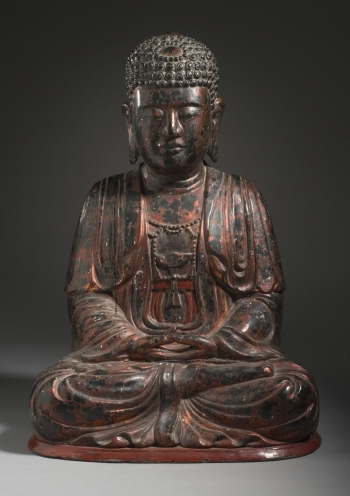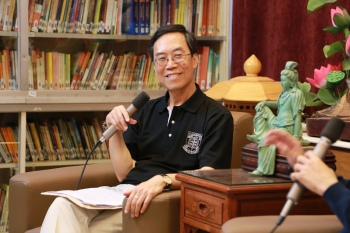Why “Even only ten times”?
Many Buddhist practitioners find the 18th Vow of Amitabha Buddha – the Primal Vow that guarantees salvation to every being that recites his name merely ten times – a ludicrous prospect. The practice required to be reborn in the Land of Bliss sounds too simple and easy. By reciting Amitabha’s name ‘even only ten times’, one can be reborn in the Land of Bliss. Everyone can do it. It is almost too good to be true.
Some may query, “If it is so simple and easy, all beings should be experiencing rebirth in the Pure Land. How can one be reborn in the Pure Land without cutting off all delusions and afflictions? It is contrary to the law of cause and effect and the virtue of personal responsibility. How can an evil being not be subjected to karmic forces at death and instead be saved by Amitabha Buddha? An evil person does not deserve to be reborn in the Land of Bliss just because he or she recites the Name! It is a ‘violation’ of the universal law in our world. It’s impossible!”
Certainly, Pure Land Buddhism is difficult to believe, though easy to practice. It sounds incredible precisely because Amitabha’s power is inconceivable, incredible beyond imagination. It is unbelievable because they do not understand and do not realize the original intent of the Buddha. It is astonishing because they align Pure Land Buddhism with the context of other Buddhist sutras, rather than the canon of the three Pure Land sutras.
For instance, the interpretation of the 18th Vow by Master Shandao (631 – 681 A.D.), the de facto founder of Pure Land Buddhism in China, is very simple and clear; it is entirely unambiguous. In his Dharma School of Contemplation and Recitation, he says:
If, when I achieve Buddhahood, sentient beings of the ten directions who wish to be reborn in my land and recite my name, even only ten times, should fail to be born there relying on the power of my Vow, may I not attain perfect enlightenment.
This passage is a simplified version of the 18th vow, which clearly points out that, if one wants to be reborn in Amitabha’s land, even if one recites his name only ten times, one would certainly be reborn there. Upon hearing, believing and accepting the Amitabha’s teachings, one who wishes to be reborn in his land can do so by reciting Amitabha’s name “even only ten times.”
‘Even only’ means ‘worst to the worst’; it denotes the most critical moment and the most minimal scenario. Therefore, if Amitabha-recitation works in effect under this most adverse condition, it must work under all circumstances. That is why Amitabha Buddha says ‘even only ten times’ in his 18th vow.
Master Shandao interpreted ‘even only ten times’ as “up to a lifetime’s recitation, for the rest of one’s life” and “just ten recitations, or even a single recitation or thought, for a person at the point of death.”
‘Up to a lifetime’s recitation or for the rest of one’s life’ means if a person is healthy and can live for another year, two years, or over a few decades, he or she should recite Amitabha Buddha’s name ‘up to a lifetime’s recitation.’ If one encounters and hears the Pure Land teaching and the name of Amitabha Buddha only when one is about to die, that is “a person at the point of death.” Under such critical circumstance, to recite for a day or even an hour, ten times, once or just enough to come up with a sincere thought is regarded as “to recite my name, even only ten times.”
“Relying on the power of my Vow” means that one is relying on the power of Amitabha’s Vow, which can allow him or her to leave samsara and be reborn in the Land of Bliss. One can also expedite his or her attainment of Buddhahood in the Pure Land. Thus, Master Shandao uses the following verse to explain the 18th Vow, and does so in a very clear and easy to understand manner.
The 18th Vow says: If, when I achieve Buddhahood, sentient beings of the ten directions who sincerely and joyfully entrust themselves to me, wish to be reborn in my land and recite my name, even ten times, should fail to be born there, may I not attain perfect enlightenment. Excepted are those who commit the five gravest transgressions or slander the correct Dharma.
There are only 36 Chinese characters in this vow. Unfortunately, we lack the wisdom to interpret its profound meaning, which resulted in many erroneous explanations. These misinterpretations have caused many unnecessary complications when it is really quite simple. Master Shandao’s interpretation is clearer to understand, and therefore easier to practice.
“Sincerely and joyfully entrust” means the wholehearted, one-minded commitment to reciting Amitabha’s Name exclusively. No other practice is needed. This is what Amitabha asks us to put our trust in. The key point is exclusivity. Faith is always the dominant factor in relation to rebirth in the Pure Land, not the practice. The prime purpose of Amitabha-recitation in Pure Land Buddhism is to reaffirm faith in Amitabha’s deliverance, rather than to practice for the sake of cultivating any merits and virtues.
The explanation of the fulfillment passage of the 18th Vow
Moreover, Master Shandao used 48 characters to connect and explain the 18th Vow and its fulfillment passage. How did he do that? He said:
If, when I achieve Buddhahood, sentient beings of the ten directions who wish to be reborn in my land and recite my name, even ten times, should fail to be born there relying on the power of my Vow, may I not attain perfect enlightenment.
Today Amitabha is before us, having achieved Buddhahood. We should know that his Fundamental Vow has been unequivocally fulfilled. If sentient beings recite his name, they will certainly be reborn in the Land of Bliss.
This is an important conclusion of the 18th Vow. The first half of passage is written from the standpoint of Amitabha Buddha, who makes the great vow to deliver all sentient beings. The second half is written from the standpoint of sentient beings who should recite Amitabha’s name in order to be reborn in the Land of Bliss, as the great vow has been fulfilled by Amitabha Buddha. Faith or entrustment through Amitabha-recitation connects the reciters with Amitabha Buddha, who brings the rebirth of the reciters in effect.
The sentient beings mentioned in the vow refers to all those who have not subdued their greed, anger and ignorance. That is the kind of sentient beings we are. We are the targets of Amitabha Buddha’s deliverance! Even the ‘worst’ beings in the most critical situation are assured of rebirth in his Pure Land, so long as they recite the name of Amitabha Buddha. That’s why all sentient beings will certainly achieve rebirth in his Pure Land if they recite Amitabha’s name.
“Certainly” means 100% assured. It is certain, unconditional, and guaranteed. Why? It is because “today Amitabha is right before us, having already achieved Buddhahood.” Bhikkhu Dharmakara, the last rebirth of Amitabha Buddha, has already attained perfect Enlightenment, and became Amitabha Buddha ten eons ago.
Referring to the statement “we should know that his Fundamental Vow has been unequivocally fulfilled,” we know that the 18th Vow is the profound and serious resolution undertaken by Amitabha Buddha during the causal stage of his path to Buddhahood. Such a vow is substantial, real and fulfilled, therefore the power generated by this vow is colossal and infinite. So long as we recite his name for the rest of our lives, we will assuredly be reborn in his Pure Land, plain and simple.
No one else has ever explained the Fundamental Vow of Amitabha Buddha so clearly, concisely and precisely as Master Shandao. Shandao’s exegesis leaves little room for misinterpretation.
Unlike other Bodhisattva or Mahayana schools, ease in practice is the benchmark in Pure Land Buddhism. Nagarjuna categorized the Pure Land teaching as an “Easy Practice Path” in Mahayana Buddhism. It is easy because the teaching is simple to understand, the method of practice is easy, and most importantly, Amitabha’s deliverance and rebirth in his paradise is assured in this life.
Easy, but almost none get there
Pure Land Buddhism is a religion of faith as it involves the teaching of the salvation of Amitabha Buddha, or deliverance by ‘other-power’, so it must be easy and simple to practice. However, it is extremely difficult to believe. That is why it says in the Infinite Life Sutra, “To ascend up to the unsurpassed Way, it is easy but almost none get there.”
But we need not be discouraged. According to Pure Land theology, Amitabha’s will is proactive, egalitarian, and unconditional. Moreover, as his dedication and deliverance has no reservation and no hesitation, he designs and implements the easiest method for sentient beings to receive his merits and virtues. For the Pure Land school, Amitabha-recitation is the most ideal practice because it is the easiest. If we put ourselves in Amitabha’s position (although his true position is vast and incomparably beyond our understanding), we glimpse why Pure Land teaching and practice is easy.
















